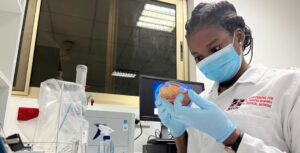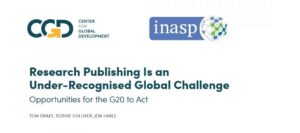Online? Free? Open access? Confusions of a West African researcher
Last week I spent a great few days in Accra with a group of early career researchers from West Africa, including participants from Ghana, Nigeria, Cameroon, and Sierra Leone. It was a lively event, organised with RIPS at the University of Ghana, the British Academy and the ACU — some great discussion, some enthusiastic, energetic researchers — and a valuable reminder of some of the difficulties that many researchers face.
Publishing was a hot topic. There was a great deal of uncertainty about the process generally, but what struck me most was the confusion around some of the basics, and the impact this essential misunderstanding was having on their work.
The aim of the workshop was to give a group of early career scholars a few days of practical support and advice, with sessions from experience researchers from Ghana, Cameroon and the UK. There were ideas on identifying their niche, selecting the right methods, guidance on how to get grants (and crucially how to cope with rejection), and thoughts on how to find a mentor to guide them in the process (led expertly by AuthorAid’s Ravi Murugesan).
Getting hold of journals and getting published were, unsurprisingly, two themes that generated much discussion. Some of the work we’ve presented at past PfD conferences formed the introduction to the first of these, followed by a fact-packed session from Helena Asamoah-Hassan from KNUST (and INASP’s country coordinator for Ghana, amongst other things). And publishing was addressed in intensive fashion by an ASAUK writing workshop over the last couple of days.
The conversations around journal access were familiar. But one of the things that stayed with me was how confused many of the participants were about journals as a whole. This fed both into their use of particular resources, and their approach to publishing.
Open access, online, free, international, local… the labels — often terms we don’t use that consistently ourselves – were routinely misunderstood or mixed up.
Free journals were considered low quality — they must be if they were free, surely; after all, wouldn’t you keep the good stuff locked away? This seemed to be the case for OA titles too. The place to read the better research – and to publish it — must be in the ‘traditional’ titles seemed to be a general feeling.
All of the participants were social scientists or humanities researchers — so aside from handful working in health and population subjects, perhaps this entails a lower familiarity with the higher profile open access movement in health and medical-related research.
‘Online’ seemed to engender a fair degree of distrust and suspicion – perhaps unsurprisingly, and wisely in some cases given the region’s unfortunate reputation for online scams, and the many dubious quality publishing outlets that have sprung up online around the world. But this seems to mean that many high-quality, peer reviewed online titles are being overlooked, or seen as second class options, and even where ‘print’ titles were trusted, if they were encountered principally online, there was a sense that they might be less trusted sources.
This is codified in many institutions by the criteria for assessment and promotion. Panels of older academics might discount articles published online when considering promotions, or in students’ submitted work. ‘International’ journals are routinely considered higher status than ‘local’ journals, but as the boundaries blur, and the terms become less appropriate in an electronic world, there need to be more sophisticated ways for researchers to understand and assess quality.
There’s undoubtedly some essential — and urgent — work to be done in helping both emerging and more established researchers to navigate the journal world more confidently and effectively. Perhaps we need to start with a straightforward “how to” or a “researcher’s introduction to journal publishing”. And at the same time we need to help universities and their senior academics understand some of the changes in the publishing world so that they can respond appropriately — recognising the quality of their researchers’ work, and guiding them to publish in the right places.
[The workshop was a follow-up to the Foundations for the Future report launched by the British Academy and the ACU in February — the full report sets out in greater detail some of the challenges facing early career researchers, and forms part of the ‘Nairobi Process’ on strengthening social sciences and humanities research on the continent]
This was originally posted May 5th 2012 on Publishers for Development.




